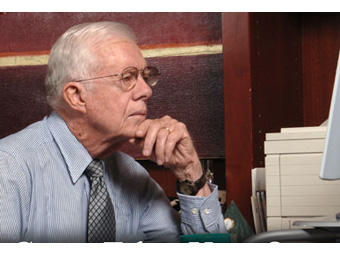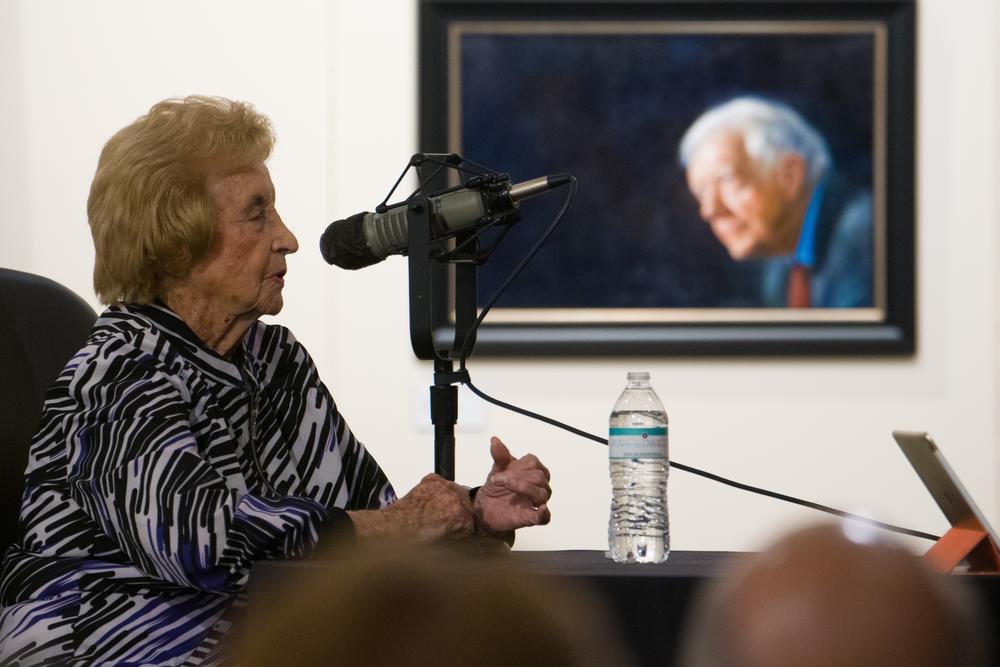
Section Branding
Header Content
Georgia Today: Mourners pay respects to Jimmy Carter; 'Peanut Brigade' and the Carter pres. campaign
Primary Content
LISTEN: On the Monday, Jan. 6 edition of Georgia Today: Mourners in Atlanta pay their respects to former President Jimmy Carter; a member of the Peanut Brigade reflects on her time spent with the Jimmy Carter presidential campaign; and those accused of crimes related to Jan. 6 four years ago wonder what comes next.

Peter Biello: Welcome to the Georgia Today podcast from GPB News. Today is Monday, Jan. 6. I'm Peter Biello. On today's episode, mourners in Atlanta pay their respects to former President Jimmy Carter. A member of the Peanut Brigade reflects on her time spent with the Carter presidential campaign. And those accused of crimes related to January 6th four years ago wonder what comes next. Those stories and more are coming up on this edition of Georgia Today.

Story 1:
Peter Biello: The chief federal prosecutor in the Northern District of Georgia is resigning, clearing the way for President-elect Donald Trump to name his replacement. GPB's Chase McGee reports.
Chase McGee: Ryan Buchanan has served as the district's U.S. attorney since May of 2022. A statement from his office announcing his resignation noted several successful prosecutions during his tenure. They include violent crime, national security and other convictions. It's not unusual for presidentially nominated and Senate-approved prosecutors to resign ahead of a new administration instead of being fired. Georgia has two other U.S. attorneys, Peter Leary in the Middle District and Jill Steinberg in the Southern District, both nominated by Joe Biden. For GPB News, I'm Chase McGee.
Story 2:
Peter Biello: While Congress certified Donald Trump's electoral victory without incident today, Georgians accused or convicted in the Capitol attack four years ago are wondering what comes next. Trump has promised to pardon or commute the sentences of Jan. 6 defendants once he's sworn in as president. Georgia's most high profile capitol breach cases include those against a former lawyer from South Georgia's Sumter County, William Calhoun Jr.; a former car salesman from Savannah, Dominic Box; and an unsuccessful Republican candidate for Congress, Chuck Hand. A Department of Justice database shows more than two dozen Georgia cases related to the attack in various states of prosecution.

Story 3:
Peter Biello: Mourners spent the weekend paying their respects to former President Jimmy Carter at the Carter Center in Atlanta, where he lies in repose. Mourners are led through the Carter Museum and Presidential Library to see artifacts from Carter's life and presidency before arriving at his casket. Berstine Hollis was a family friend of the Carters who has worked at the Carter Center for 42 years. She says she hopes the former president's death prompts mourners to reflect on his legacy.
Berstine Hollis: I would hope that they would take a look at themselves internally and ask the question, "What can I do to help or how can I help?"
Peter Biello: Lisa Miller drove to the Carter Center from Jacksonville, Fla.
Lisa Miller: I was the same age as Amy Carter when her dad took office. And watching it on the news, it just kind of sort of like today's children are inspired by Disney princesses. And I was inspired back then as a little girl that, you know, someone my age could go live in the White House.
Peter Biello: Scott Lyle of New York City had come down to Georgia to visit his mother. He described Carter as his hero. He says he volunteered with the former president building houses at nine locations, including Haiti, India, L.A. and Detroit. And that gave him a chance to see Carter up close.
Scott Lyle: He was an amazing man. He cared about others. He walked the walk. And I can't think of anyone else that I would want to stand in line to pay my respects for.
Peter Biello: William Mendoza came from Knoxville, Tenn.
William Mendoza: When I think about Jimmy Carter, I just think about a man for the people just ready to work for people. You know, he wasn't your common politician to become president. He was a peanut farmer. He barely became governor. And then he ran for president. And he's not your normal or your — your ideal type. But when he became president, he was he always said, "I'm not going to lie to you." And that's what we need more and more politicians like that, I think. That's what I think about when I think about Jimmy Carter.
Peter Biello: Mourners can continue to pay their respects to Carter at the Carter Center through 6 a.m. tomorrow morning.
Story 4:
Peter Biello: Maranatha Baptist Church held its first Sunday school lesson since Carter's death. President Carter's niece, Kim Carter-Fuller, began by asking the congregation to pray for the Carter family. She went on to say, while people are grieving the loss, her uncle was ready when he passed on Dec. 29.
Kim Carter-Fuller: We're gonna have to learn how to cope without Uncle Jimmy down the road, but I liked the last two words. New magic. There's new magic. And up there in heaven. He's experiencing that new magic right now.
Peter Biello: Jimmy Carter taught Sunday school at the church for decades until he was well into his 90s.

Story 5:
Peter Biello: When a peanut farmer from Georgia was elected president of the United States. Author and historian Douglas Brinkley said it was, quote, the closest America has come to picking a president out of the phone book. Jimmy Carter's homespun style and scrappy grassroots campaign was something different in 1976. Instrumental in that campaign was Dot Padgett, an activist from Douglasville, west of Atlanta, who organized the famous Peanut Brigade: Carter campaign volunteers who fanned out across the country. Padgett, now 97 years old, shared her memories of Carter in her book Jimmy Carter: Elected President with Pocket Change and Peanuts. She spoke with GPB's Orlando Montoya.
Dot Padgett: When I met him, I was the mother of four children working in the yard, in my front yard and in my yard and absolutely love working in the yard. And I wondered one day: "I pull weeds, I rake leaves, I plant flowers; What will I ever tell my grandchildren that I ever did in my life?" And just at that moment, a car drove up to the curb and a man walked out and it was Jimmy Carter. And he walked up in my yard and asked me if I would volunteer for him to work in his race for governor.
Orlando Montoya: And you write that you had a sense of Jimmy Carter's future when you saw him for the first time. What did you see in him that impressed you?
Dot Padgett: In 1970, I really did not know Jimmy Carter. I had heard the name. My husband had visited him briefly on some banking business, but nothing political. And what impressed me with what I did know about him was the people that he surrounded himself with. And they essentially were — had the same values that I had and the same vision. And I thought, "well, if these people support him, then that must be the same values that he has."
Orlando Montoya: Fast forwarding a few years to 1976, Carter's 1976 presidential campaign was run by a 26-year-old Hamilton Jordan, the future chief of staff of the president. What was your role in the campaign?
Dot Padgett: As a volunteer in 1975, I was asked to help raise money. Rosalynn Carter would campaign three weeks out of a month in other parts of the country. I would schedule a week for her in the state of Georgia and we would go around. And the little ticket that we sold to meet and greet Rosalynn Carter sold for $10. So we set up a series of luncheons, coffees and teas to meet Rosalynn Carter. There was absolutely no money in that campaign at all. My only connection to it before then was they were having a yard sale to raise money to pay the rent. It was quite different from what we hear now.
Orlando Montoya: I don't think a yard sale is going to pay for a campaign today.
Dot Padgett: A yard sale would not pay for one hour of what they do today. It's — it's totally different. I'm probably one of the few people that know absolutely the difference between that campaign. We were under the federal election laws as a result of Watergate. We were allowed for the entire campaign $31 million that we could spend. I don't think anybody can grasp the meaning of that, do you?
Orlando Montoya: It sounds like it's peanuts.
Dot Padgett: It was peanuts and pocket change.
Orlando Montoya: The Peanut Brigade sent volunteers, many with Southern accents, to knock on doors and hand out fliers across the country. How did voters in the cold of New Hampshire and the Midwest respond to you guys?
Dot Padgett: Well, this was a campaign strategy, and it was before it even had the name Peanut Brigade. Part of the campaign structure was there were nine Democratic candidates in that primary. Names that people recognized — senators, congressmen, people that you had seen their names in the paper — and a peanut farmer from South Georgia. So how do you set him apart? So they determined to send a plane full of Georgians to New Hampshire. And we spent a week there. We had some interesting things happen. I know one woman — her husband happened to be mayor of Plains — she knocked on the door. The lady opened the door, cracked it open a little bit, and she's standing there in the freezing cold. She said, "I'm here from Georgia to ask you to vote for my friend Jimmy Carter for president." But she said, "I am so damn cold," she said, "I don't care who you vote for." They invited her in; they liked honesty. And I mean, if you were a voter and you were faced with nine people and you had somebody to sit down and talk to you, it made a difference. I spoke to a man and he was very kind. And he took my brochure. He looked at it. I gave him my entire story and he took the brochure and he said, "Young lady, I love the way you have said it, but I have not understood a word you have said." It was our Southern accents. But he said, "I'll take your brochure and I'll read it." He won that. He won that race. He had won in Ohio and Iowa. And so that really is the thing that put him in the spotlight.
Orlando Montoya: When Carter was elected president, you became assistant chief of protocol at the State Department. What did that role entail?
Dot Padgett: Well, mine was specifically for the international visitors that were invited by the president to come to this country on an official visit. And our office was to organize and travel with them. Specifically, protocol has nothing to do with the political aspects. We stay away from that. Our job is to a visitor that comes here, help them look good in their own country to keep them on a schedule. That was primarily what our example was.
Orlando Montoya: Now, a lot of people close to Carter, like yourself, ended up in Washington roles. How did you see the culture clash of South Georgia going to Washington play out during Carter's time?
Dot Padgett: Well, personally, I had an absolutely wonderful time in Washington. I made a lot of friends and it gave me a head start. But no, the press, the restaurants, they were not very friendly because we didn't have a lot of money and we worked long hours every day and there was not a lot of time for recreation. And so they thought that we were either antisocial or either we didn't have the presence enough to enjoy the Washington, D.C., life. But mostly it was because we just worked hard.
Orlando Montoya: Do you think he was misunderstood while he was president?
Dot Padgett: Oh, I think he was misunderstood. If you read his speeches, you will see some gems there, some treasures, but no one would pick it up because his delivery was not the delivery of a movie star. A lot of attention has been focused on the Peanut Brigade because that's a large part of it, and I'm not unhappy about that at all because it was 600 people that deserved credit. But I would like for people to actually take a look at what he was able to accomplish and maybe he can rise up through the ranks of history as one of our best presidents. I don't know. I think it will take some time for that to happen, but I eventually do believe that will happen.
Peter Biello: That was Dot Padgett, who was part of Jimmy Carter's peanut brigade in 1976. Her book is called Jimmy Carter: Elected President with Pocket Change and Peanuts. She spoke with GPB's Orlando Montoya.
Peter Biello: And that is it for this edition of Georgia Today. If you want to learn more about any of these stories, visit GPB.org/news. And if you haven't subscribed to this podcast yet, we hope you'll do it right now. That way you'll be able to stay on top of the news. We'll pop up in your podcast feed automatically tomorrow afternoon. And if you've got feedback, send it our way by email. The address is GeorgiaToday@GPB.org. I'm Peter Biello. Thanks again for listening. We'll see you tomorrow.
---
For more on these stories and more, go to GPB.org/news



